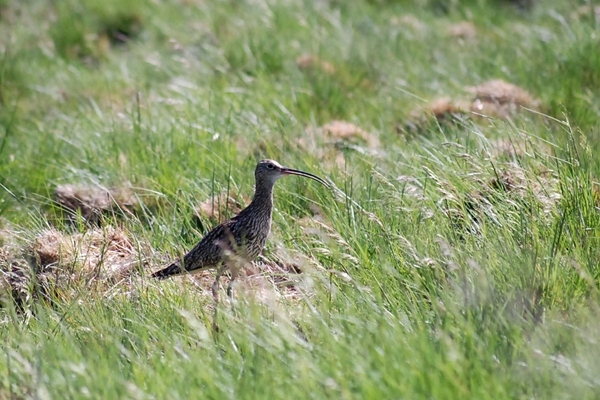
THE Curlew Country project - part of the UK lowland recovery programme - is taking drastic action to help save a threatened species.
The recovery project, which works on the ground in the Shropshire Hills and Welsh Marches, has just released hand-reared curlew chicks – using a conservation practice known as headstarting – in a bid to help them on a local level.
The decision to intervene was not taken lightly as project workers spent two years using cameras and data loggers to monitor over 30 curlew nests, from which no chicks survived to hatch. Most were predated at egg stage by foxes, so the Curlew Country project took the much-needed step of applying for a licence to incubate 50 eggs and rear them by hand.
“We are delighted to have reared 21 chicks through to fledging that otherwise would not have made it. It has been a long, emotional process, with lots of learning along the way, but we hope that we can fill the gap that natural nesting attempts were not able to,” said project manager Amanda Perkins.
“We have always intended to act quickly to win the race against time to save these iconic birds. After two dismal years of monitoring the failure of the local, but nationally significant hotspot, of breeding curlews, we knew we had to act.”
The first batch of chicks has now flown freely, outside of their original enclosure. This is a landmark event for the project, and for national curlew conservation, as it suggests what could be possible.
Importantly, it taught those working on the project a great deal about the rearing process, ranging from the foods chicks preferred, the stages at which they needed to be moved into larger enclosures and the level of support they required to learn certain skills.
Each stage of the process brought its own challenges to the small team running the project. Locating nests before a predator gets to them is a difficult process, particularly when a curlew does its best to disguise the nest. Once collected and incubated, eggs require regular monitoring as hatching can take up to three days once the first cracks emerge. Once hatched, project staff encourage them to eat mini mealworms and chick crumbs, often using a pencil to imitate pecking until the chicks are confident to try it themselves.
The project, hosted by the Game & Wildlife Conservation Trust (GWCT), has always worked closely with the local community and invited two small gatherings of farming partners, supporters, and volunteers to glimpse them from a distance before they were set free, with steps taken to ensure not to tame the birds.
“Headstarting chicks is not a long-term solution to curlew decline, something that all of the Curlew Country team are well aware, but it will buy us time.”, notes project assistant Amber Bicheno. “Time in which wider solutions can be found, and where we can work with farmers to make a real difference.”
The reared chicks have been fitted with colour rings with a unique two letter code. This allows them to be re-identified by other birders if the code is read. If you spot a colour ringed curlew, you can report the sighting to Tony Cross, Curlew Country ornithologist, by e-mailing tony.cross@virgin.net, alternatively you can report the sighting online via the BTO website.

Notes to editors
The Game & Wildlife Conservation Trust – providing research-led conservation for a thriving countryside. The GWCT is an independent wildlife conservation charity which has carried out scientific research into Britain’s game and wildlife since the 1930s. We advise farmers and landowners on improving wildlife habitats. We employ more than 60 post-doctoral scientists and other research staff with expertise in areas such as birds, insects, mammals, farming, fish and statistics. We undertake our own research as well as projects funded by contract and grant-aid from government and private bodies.
For information, contact:
Eleanor Williams
Telephone: 07592 025476
Email: press@gwct.org.uk